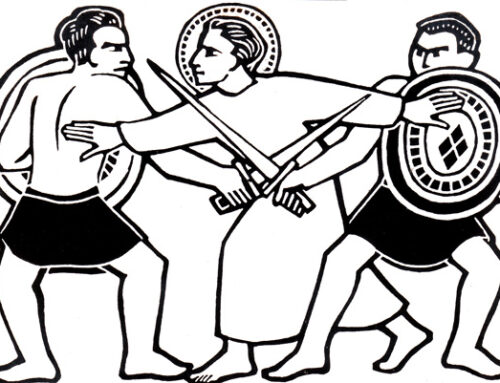Justice in the New Testament
November 20, 2016
Categories: Justice
This blog post is Part 4 in a 12-part blog series on Christianity and justice. (If you missed the first post, you can find it here.) In addition to the Old Testament and the life and teachings of Jesus, justice was a major focus for the early church. This focus on justice appeared both in the actions of the early church and the writings of the early apostles.
A major focus of the early church was economic justice and helping those who were in need. In the book of Acts, the early church was described as follows: All the believers were together and had everything in common. They sold property and possessions to give to anyone who had need (Acts 2:44-45). All the believers were one in heart and mind. No one claimed that any of their possessions was their own, but they shared everything they had. With great power the apostles continued to testify to the resurrection of the Lord Jesus. And God’s grace was so powerfully at work in them all that there were no needy persons among them. For from time to time those who owned land or houses sold them, brought the money from the sales and put it at the apostles’ feet, and it was distributed to anyone who had need (Acts 4:32-35).
The New Testament describes the early church as focused on racial and cultural justice as well, as the apostles reached out and shared the Gospel to others irrespective of their racial or cultural background. For example, Acts 8 tells the story of Philip, who shared the good news about Jesus with a high-ranking Ethiopian and baptized him.
This spread of the Gospel to the Gentiles (i.e., non-Jews) was not an easy process, and the early church struggled to understand how the Christian faith should look as it spread beyond the Jewish people to the Gentiles. One of the turning points in this shift involved a relationship between Peter and a Gentile named Cornelius.
Cornelius was a Godly man, who had a vision in which God told him to send for Peter. The following day, Peter had a vision in which a sheet came down from heaven, full of unclean animals that Jews were not allowed to eat. A voice told him to kill and eat. When Peter refused, the voice answered, “Do not call anything impure that God has made clean” (Acts 10:15).
When Cornelius invites Peter into his house, Peter began to understand what God was trying to teach him in the vision. “You are well aware that it is against our law for a Jew to associate with or visit a Gentile. But God has shown me that I should not call anyone impure or unclean” (Acts 10:28-29). “I now realize how true it is that God does not show favoritism but accepts from every nation the one who fears him and does what is right” (Acts 10:34).
The letters of the New Testament support the focus of justice in the early church. When Peter was persuaded by others to pull back from his fellowship with the Gentiles, Paul opposed him to his face (Galatians 2:11-14). Paul attempted to break down the cultural barriers that divided and separated people. So in Christ Jesus you are all children of God through faith, for all of you who were baptized into Christ have clothed yourselves with Christ. There is neither Jew nor Gentile, neither slave nor free, nor is there male and female, for you are all one in Christ Jesus (Galatians 3:26-28).
James reinforces the connection between pleasing God and helping those in need. Religion that God our Father accepts as pure and faultless is this: to look after orphans and widows in their distress (James 1:27). Similarly, the writer of 1 John notes that if anyone has material possessions and sees a brother or sister in need but has no pity on them, how can the love of God be in that person? Dear children, let us not love with words or speech but with actions and in truth (1 John 3:17-18).
In the early church, love wasn’t something that was just felt internally. Love involved action, justice, and helping those in need. The early church was radical in the way it broke down barriers associated with culture, ethnicity, religion, gender, and social class.
Discussion: What do you think about how justice was expressed in the actions and teachings of the early church?
Related Thoughts
One Comment
Leave A Comment

Subscribe To My Newsletter
Join my mailing list to receive the latest blog posts.
Receive my e-book “The Mental Health Toolkit” for free when you subscribe.






[…] Click here to read Part 4: Justice in the New Testament […]